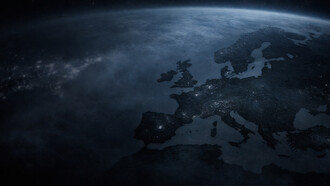People who were born after the Second World War can look back at what has been. They know how privileged they have been by living in Europe, in what can arguably be called the best era in modern history. After World War II, Western Europe has been a continent of growth, of prosperity, of human rights, of freedom of speech, of welfare states. Yes, there were problems, there was racism and discrimination, and some will say that none of this would have been possible without (neo)colonialism. But the result cannot be denied.
Today, after a quarter new century, everything is on the line. What was certain is no longer so. Welfare states are being dismantled, poor people are being jettisoned, liberal principles of democracy and human rights are being circumvented and vilified.
To properly understand and, if possible, reverse these trend, it is good to know where we are coming from, to realise how, gradually, 'values' and 'norms' have been jettisoned, how a new truth took hold, how politics and economics interacted, how, what we took for granted yesterday, is condemned today.
In this article, I want to show how truth has changed and how today, once again, we stand on the threshold of a new era that turns yesterday's successes into defeats.
After the war
World War II left the continent in ruins. A genocide that killed millions of Jews, and bombers on both sides that reduced cities to rubble.
It is worth recalling today that the new post-war world order was already being prepared at the beginning of that war or even before. Much, of course, has to do with the 1930s Krach, with the agreements between Churchill and Roosevelt in 1941, with the debates around Keynes and what would become the Mont Pèlerin Society after the war.
By 1945, the cornerstones of the new world order had been laid. There was a United Nations, in 1948 came a Universal Declaration of Human Rights, the World Bank and International Monetary Fund had existed since 1944, and the International Labour Organisation came into being in 1919. It was supplemented by the Declaration of Philadelphia, which states that labour is not a commodity.
There came a Cold War and an arms race, but in the West, Keynesianism had won. A period of freedom and prosperity began, colonies gained their independence, and the countries of the South were promised that industrialised countries would contribute to their development.
There were still wars and conflicts, yes, think of Korea, Algeria or Vietnam. There was resistance that was bloodily put down, think Madagascar or Indonesia. From the outset, there was a struggle against 'communism' that seriously hindered the democratic development of the South.
The old colonies tried to unite, think Bandung and later the Tricontinental.
At the same time, it is heartening to pull old UN texts from under the dust. Resolutions on cooperation, on the rights and duties of States, on a new international economic order, on an information order, on social progress, on a right to development ... Think also of the Brandt Commission reports, we were already writing in 1980, the good intentions were not yet out of the world.
In retrospect, it is easy to say that the West did not, in fact, want this. There was never enough political will to really engage in development cooperation, to respond to the demands of the South, to avoid today's debacle.
In the West, everything was running on wheels. Western Europe became a haven of prosperity and well-being. No, poverty was never eradicated, but there was a willingness to show solidarity, and inequality was limited. People believed in planning to some extent, the state played a role in the economic process, there was participation in many areas, and trade unions became strong partners. There was a common interest.
In retrospect, these were the 'trente glorieuses', 30 years of progress that came to a brutal end in the 1970s: the breakdown of the Bretton Woods agreements, a sharp rise in oil prices, beginning of the problem of debt in the South.
It was a drastic turnaround and the beginning of a new era. Out with Keynesianism, beginning of neoliberalism.
Neoliberal times
Profound change never comes overnight. It happens gradually, so that many people don't really notice it and only after a while notice that they earn less and everything in the supermarket has become more expensive.
Austerity policies started in the 1970s. Workers had to contribute, and the budget had to be in order.
When, after the flood of petrodollars poured over the countries of the South, Paul Volcker of the US Federal Reserve raised interest rates, that was the noose around the neck for a lot of countries. The debt burden became unbearable, the World Bank and IMF came with 'help': structural adjustment programmes, later called 'Washington Consensus' and still later simply 'neoliberalism'.
It started in Latin America, swarmed out to Africa and Asia, and landed in the European Union with the Single European Act and the Maastricht Treaty.
What exactly neoliberalism meant was not immediately clear. In retrospect, though, the different phases can be easily recognised.
It began in the 1980s with an economic programme of open borders for goods and capital, the liberalisation of markets, privatisations and deregulations.
It was followed by a period of 'social' neoliberalism, prioritising poverty reduction while simultaneously dismantling welfare states - however limited they were in the South. There was no protest because the social movements thought it was right.
It gradually became clear that neoliberalism was also a political programme. It was not about what was initially thought, downsizing the state, but rather strengthening the state in a limited number of tasks: protecting competitiveness, protecting private property, making the market work properly, and protecting consumers rather than respecting labour law.
Neoliberalism says what it is: liberalism and thus implicitly a certain degree of freedom. Human rights were high on the agenda, and democracy and respect for the rule of law were part of it. Poor people were those excluded by a paternalistic state under the guise of market protection. The solution to their problem was participation in the market. Poverty alleviation became 'social protection', but still only in defence of the market and growth. There was no longer a common interest.
In the transition from Keynesianism to neoliberalism, 'development' was also lost. The plans for industrialisation and infrastructure expansion, the collective national plans for economic and social prosperity, gave way. In their place came humanitarian aid. The economy was completely removed from democratic decision-making. What was still called 'development economics' in the 1960s and 1970s ended up in the bottom drawer. In its place came a 'pensée unique' of one single economy with the same rules for all. We called it 'globalisation' and the problem of 'underdevelopment' became a matter for the 'underdeveloped'.
Right-wing conservatism
In 1989, the Cold War came to an end. 'Democracy' and 'the market' were exported to new territories. There came 'shock therapies' to force entire populations into the new straitjacket and let capitalist forces plunder them, as it happens, time and again with territorial conquests.
It became a painful period of transition, the contours of which we are only now beginning to see. The system hit its limits, firstly because many fine words were never followed by deeds, secondly because neoliberalism could not bring prosperity for all. Poverty was not reduced and inequality was swinging. The development of financial markets often reduced good economic intentions to nothing in no time. Add to that climate change, which people only wanted to see with one narrowed eye, but which was causing a lot of mischief. There were protests, there was resistance, but without organisation, without structure, without strategy. Social movements had also come to believe in neoliberalism and advocated diversity rather than unity. With intersectionality, domination took over from exploitation. The struggle for identity overtook class struggle.
Pleas for change could no longer be answered because the state no longer had either the political or the financial resources. There were more and more demands for change, but who could answer them?
Traditionally, social democracy was the guardian of prosperity and welfare. When the victory of capitalism and the defeat of socialism were proclaimed after the fall of the Berlin Wall, social democrats got the message. It cooperated with neoliberalisation, it began to think that austerity was good for people, reinforced in this by an emerging green political movement. Change was no longer on the agenda. For the Greens, it was, but in the opposite direction: consuming less, flying less, wasting less. Understandably, the lower classes had no ears for that.
The conservative right, however, was ready with answers for those who asked for other policies. It had easy answers to difficult questions: fewer migrants, fewer refugees. Because the redistribution agenda had been dropped, people's material prosperity could only be guaranteed with ... fewer people.
Right-wing forces grew across Europe, but also elsewhere. Suffice it to think of Marine Le Pen, Giorgia Meloni, Viktor Orban and Geert Wilders, of Narendra Modi in India, Erdogan in Turkey, Jair Bolsonaro in Brazil, Javier Milei in Argentina, and finally Trump in the United States.
Today, it has become clear. A new era has begun, and norms and values that had become commonplace since the French Revolution and the Enlightenment are coming to an end. Emancipation is now out of the question.
Human rights no longer matter; at home and elsewhere in the world, they are eagerly flouted. Think here of the legislation on refugee reception or consider the growing number of homeless people. Borders are closing everywhere. Barbed wire is in. The pinnacle is the genocide in Gaza that Western governments don't even see any harm in.
The rule of law is becoming a joke, most clearly seen in the United States, but again, elsewhere, including Europe. The judiciary is losing strength, and parliaments have become powerless talking shops. Freedom of the press and freedom of speech are under pressure.
The state is becoming strong and powerful again, especially in repression. Economically, power today is more in the hands of big transnational corporations than politics. And those companies know that competition is far too difficult, that it is for losers, as Peter Thiel puts it. Long live the monopolies!
Multilateralism, international cooperation, free trade, development, and respect for international rules of law are disappearing like snow in the sun.
Social media are used to spread fake news and, above all, create a lot of uncertainty due to fear, because what is left to believe? Are all conspiracy theories wrong by definition?
Welfare states have lost. Little by little, the basic elements of social security are going for the axe: pensions, unemployment insurance, health care. Labour law is being phased out, the ITUC showed. Access to rights is becoming conditional. Recent research shows that more money and subsidies go to corporations than to social security.
During neoliberalism, poverty reduction was high on the agenda. Today, the poor are abandoned. They have to work, and those who don't want to or can't are screwed. Poverty is increasingly moralised and finally criminalised.
Right-wing conservatism puts an end to liberalism. Whether this programme can be brought to a conclusive end is still uncertain. We see in the United States how power also lies with the so-called anarcho-capitalists, who definitely do not have the same agenda as the far right. On many issues, they find common ground, such as the role of the state, which should protect the market and has no need for redistribution or a welfare state.
Where this ends, we do not know, but the path is clear. How much resistance - a revolution? - will come against this is also impossible to predict. More and more movements are beginning to realise that much of civil society has been neoliberalised.
Social policy is not lost, but it will be limited and moralising, with dehumanisation of those who cannot keep up.
Protection will henceforth be with arms, not rights.
Heavy words are used for this new policy that could take us back to a century ago. I prefer not to use them because many elements are still uncertain and history never repeats itself in the same way. The increasing violence in society, including the thugs coming to 'bring order', rightly instils much fear.
The new era promises 'freedom' to do as one pleases, but fewer and fewer people have the means to do so. Moreover, the digital sector is being abused for an invisible but increasing control of people. Inequality is already assuming such hallucinatory proportions that ordinary people are massively and powerlessly excluded.
Capitalism
Of course, the three periods I have described were three periods of capitalism, but it may be clear that this capitalism exists in different variations.
It may be equally clear that the course of history is not written in the stars. Even today, there are exceptions, countries that do still try to defend a common interest. Consider Mexico, Brazil or an entirely different political model in China. There is a wide range of possibilities open, one has to want to see them and work on them. One has to stop believing that everything can be settled at the local level with horizontality and 'bottom-up'. Whatever policies one wants to defend, one will have to look and work beyond borders.
One may also have to stop a simplistic anti-capitalist message that is over a hundred years old but has achieved little. We need to get out of that capitalism, no doubt about that, but we also need to get away from nationalism and identity thinking. We need to look for new alternatives, perhaps with new concepts and certainly with new practices. Is enough work being done on this?
The time of the boomers is over. It is the new generations that must make their world with one ultimate goal: peace, the condition for everything else.















